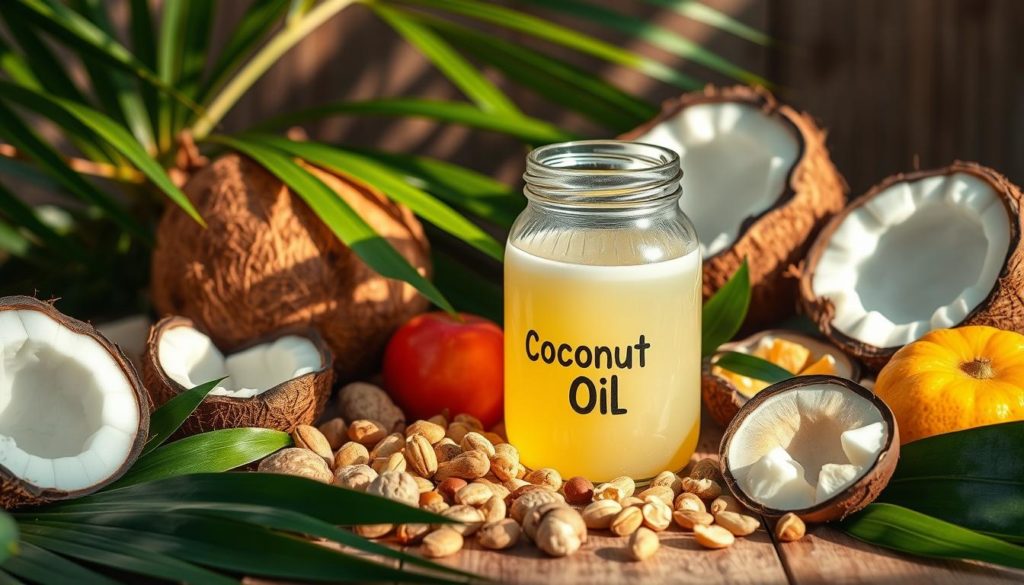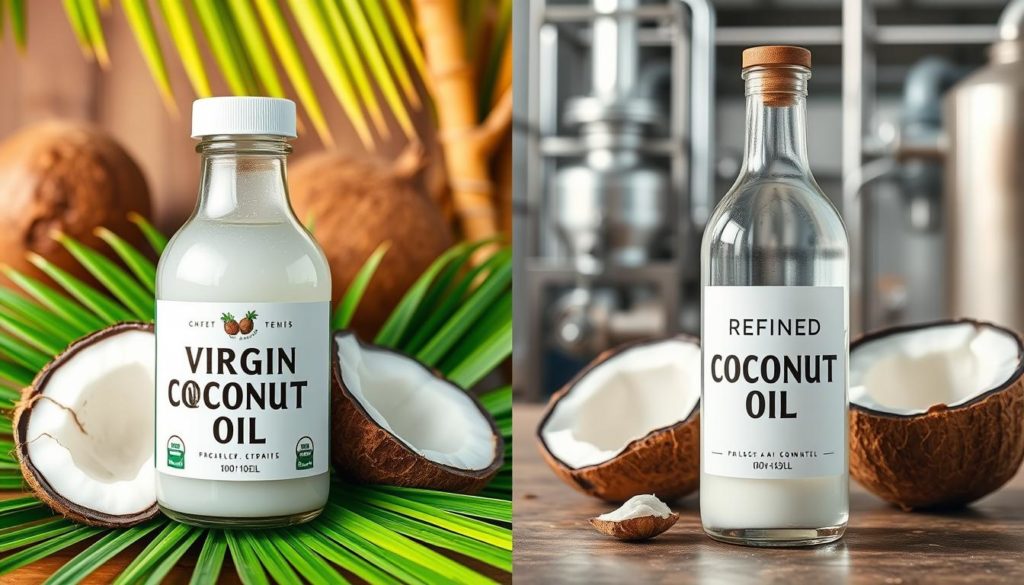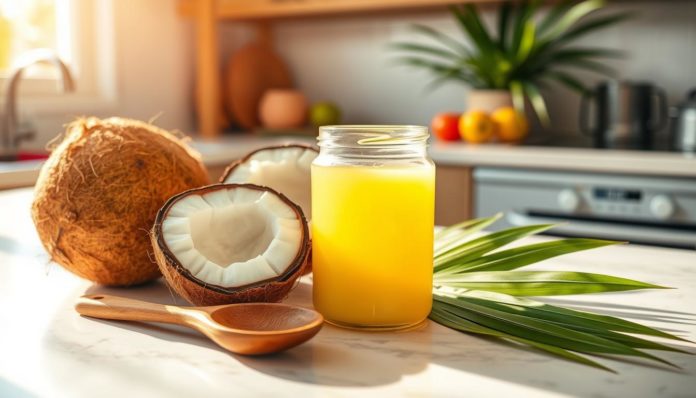Using coconut oil daily can deeply enhance your health. It’s not just a natural cure but also boosts your wellness in many areas. It’s great for your skin and hair, and adds vital nutrients to your diet. Discover how this amazing oil can change your life for the better.
The Nutritional Profile of Organic Coconut Oil
Organic coconut oil is known for its nutritional benefits. It’s a key part of a healthy diet. Let’s dive into what makes it so good.
Caloric Content
A tablespoon of organic coconut oil has about 120 calories. Thanks to its healthy fats and medium-chain triglycerides (MCTs), it boosts energy instead of being stored as fat.

Healthy Fatty Acids
Coconut oil is full of healthy fats, especially medium-chain triglycerides. MCTs give you quick energy and help burn fat efficiently. Organic coconut oil is great for adding nutritional value to your meals.
Antioxidant Properties
Organic coconut oil also has lots of antioxidants. These fight oxidative stress by tackling free radicals. This can lower the chance of chronic diseases. Adding organic coconut oil to your meals boosts cell health and overall wellbeing.
The Difference Between Virgin Coconut Oil and Refined Coconut Oil
Choosing between virgin and refined coconut oil involves understanding their unique features. Each type offers specific health benefits and uses. This knowledge can help guide your dietary choices.
Production Methods
Virgin coconut oil comes from fresh coconuts without high heat or chemicals. This keeps its natural goodness. Refined coconut oil, however, goes through extra steps including bleaching and deodorizing. These steps remove flavor and increase shelf life.

Health Benefits Comparison
Virgin coconut oil is loaded with antioxidants and essential nutrients like lauric acid. Refined coconut oil has medium-chain triglycerides (MCTs) but fewer antioxidants. This is due to its processing.
| Aspect | Virgin Coconut Oil | Refined Coconut Oil |
|---|---|---|
| Production Process | Cold-pressed, unrefined | Bleached, deodorized |
| Antioxidants | High | Low |
| Flavor | Coconut aroma | Neutral |
| Shelf Life | Shorter | Longer |
Best Uses for Each Type
Virgin coconut oil’s flavor and nutrients are great for raw foods and beauty uses. Refined coconut oil, tasteless and with a higher smoke point, is better for cooking. Your choice depends on your health goals and taste preference.
Benefits of Coconut Oil for Hair Health
Explore the amazing benefits of coconut oil for your hair. It’s a popular choice for natural hair care. Coconut oil makes your hair shiny and soft. It also reduces hair damage and boosts hair health.
Reducing Hair Damage
Coconut oil is great for your hair because it goes deep into the hair shaft. This deep action cuts down on protein loss that often leads to hair damage. Using it regularly creates a shield. This shield protects your hair from bad stuff in the air and harsh chemicals.
Promoting Hair Growth
Coconut oil doesn’t just fight hair damage. It also helps your hair grow. It feeds your scalp and hair roots important nutrients. This feeding encourages new and thicker hair to grow. By using coconut oil, you strengthen your current hair and get more new hair. It’s a key player in natural hair care.
Coconut Oil for Skin: Natural Moisturizer and Protector
Coconut oil is amazing for skin health. It hydrates, fights aging, and protects. It’s a top choice as a natural moisturizer.
Hydration and Smoothness
Coconut oil makes your skin smooth. It locks in moisture to avoid dryness. Your skin feels soft and looks better.
With regular use, it improves your skin’s texture. It tackles rough or flaky spots effectively.
Anti-Aging Benefits
Coconut oil is great against aging. It keeps skin flexible by preserving its natural barrier. This reduces fine lines and wrinkles.
Its antioxidants fight off damage from free radicals. So, it helps stop early signs of aging.
| Benefit | Description |
|---|---|
| Hydration | Locks in moisture to keep skin smooth and supple. |
| Anti-Aging | Reduces appearance of fine lines and wrinkles, maintaining elasticity. |
| Protection | Forms a barrier against environmental pollutants and irritants. |
| Natural Ingredients | Derived from natural sources, free from synthetic chemicals. |
Boosting Immune System with Coconut Oil
Coconut oil is a strong supporter of the immune system thanks to its special makeup. It’s loaded with lauric acid, which has amazing benefits. These include fighting microbes and reducing inflammation to help the body tackle harmful agents.
Antimicrobial Properties
Using coconut oil for its antimicrobial qualities is key for strengthening immune defense. Lauric acid turns into monolaurin in our bodies. This substance is tough on bacteria, viruses, and fungi. So, adding coconut oil to your meals is a smart move.
| Component | Function |
|---|---|
| Lauric Acid | Provides antimicrobial and *anti-inflammatory* properties |
| Monolaurin | Supports the body in fighting bacteria and viruses |
Adding coconut oil to your daily life is easy and good for your immune system. Its natural ability to fight microbes and inflammation makes it essential. It’s a natural way to enhance your health.
Cold Pressed Coconut Oil vs Hot Pressed: Which is Better?
Choosing between cold pressed and hot pressed coconut oil is important. It helps to understand how they are made and what nutrients they keep.
Extraction Process
The extraction process for cold pressed coconut oil uses fresh coconut meat. It’s pressed at temperatures below 120°F. This method keeps the oil’s natural taste, smell, and nutritional value.
Hot pressed coconut oil, however, comes from dried coconut meat or copra. It’s made at high temperatures. This method might use chemicals and makes more oil but could lose some nutrients.
Quality and Nutrient Retention
Cold pressed coconut oil is often seen as better quality. Its low-temp making process holds onto important fats, antioxidants, and vitamins. This makes it a healthier choice.
In contrast, hot pressed coconut oil might not keep these healthful parts because of the heat and extra steps in its making.
| Aspect | Cold Pressed Coconut Oil | Hot Pressed Coconut Oil |
|---|---|---|
| Extraction Process | Low temperature, fresh coconut meat | High temperature, dried coconut meat (copra) |
| Nutrient Retention | High | Moderate to low |
| Flavor and Aroma | Natural and fresh | Less pronounced, sometimes requires refining |
Why Coconut Oil is Great for Cooking
Coconut oil is a top choice for cooking thanks to its health perks and versatility. It’s great for multiple cooking styles because it has a high smoke point. This means you can fry, sauté, or bake with it without producing harmful substances.
When you’re replacing other oils, coconut oil stands out with its unique taste and nutrients. It’s packed with medium-chain triglycerides (MCTs) that boost your metabolism and energy. Plus, it fights microbes and is full of antioxidants, helping you stay healthy.
Want to know why coconut oil is a favorite? Let’s compare it with other oils:
| Oil Type | Smoke Point | Key Benefits |
|---|---|---|
| Coconut Oil | 350°F (177°C) | High in MCTs, antimicrobial, antioxidant-rich |
| Olive Oil | 375°F (191°C) | Rich in monounsaturated fats, anti-inflammatory |
| Vegetable Oil | 400°F (204°C) | Neutral flavor, inexpensive |
With all its benefits, coconut oil is a must-have in the kitchen. It cooks food safely at high temperatures. It’s also packed with nutrients, making it an excellent choice for healthy diets.
Coconut Oil Uses in Daily Cooking Recipes
Exploring different ways to cook with coconut oil can make meals more exciting. You can use it for baking, sautéing, or adding it to salad dressings and smoothies. It’s versatile and packed with health benefits.
Baking with Coconut Oil
Baking with coconut oil can enhance your desserts. It adds a mild coconut flavor and many nutrients. Use it instead of butter or vegetable oil in your cakes, cookies, and muffins for moist, tasty treats.
Frying and Sautéing
Coconut oil is great for frying and sautéing because it has a high smoke point. Using it instead of other oils adds a nice smell and healthier fats to your dishes. This can boost your well-being.
Salad Dressings and Smoothies
Adding coconut oil to dressings and smoothies makes them more nutritious. It helps mix dressings well and makes smoothies creamy. Plus, it boosts their nutritional content.
| Cooking Method | Benefits | Usage Tips |
|---|---|---|
| Baking | Moist texture, subtle coconut flavor | Replace butter or vegetable oil with equal amounts of coconut oil |
| Frying and Sautéing | High smoke point, fragrant aroma | Perfect for stir-fries and pan-frying |
| Salad Dressings and Smoothies | Emulsifies dressings, smooth texture | Blend well to avoid separation |
Choosing the Best Coconut Oil for Your Needs
Choosing the right coconut oil involves several factors. First, focus on the quality. High-quality coconut oil often has organic labels. This means it meets strict rules for production and sourcing. Look for certifications to show it’s organic.
Another key factor is fair trade certification. Fair trade coconut oil ensures producers get fair pay. This supports ethical practices. Plus, it often means the product is of better quality. Fair trade farms and factories usually have higher standards.
Distinguishing between refined and unrefined coconut oil is important. As this guide explains, refined coconut oil has a milder taste and is great for cooking. Unrefined, or virgin, coconut oil has a strong coconut flavor. It’s better for use on skin and hair.
Here’s a quick summary of what to consider for the best coconut oil:
- Organic labels: Ensure the oil is organic by checking certifications.
- Fair trade: Choose fair trade to support good practices and quality.
- Quality selection: Decide between refined and unrefined based on use.
Paying attention to these details will help you choose the best coconut oil. Whether it’s for cooking, skincare, or hair care, the right choice will offer many benefits. It will also match your health and ethical preferences.
Exploring the Beauty Benefits of Coconut Oil
Coconut oil is a star in natural skincare and beauty treatments. It’s versatile and works well both in homemade solutions and in store-bought products. If you’re into making your own skincare or prefer products with natural ingredients, coconut oil is perfect for you.
DIY Beauty Treatments
Love making your beauty products? Coconut oil is essential. It’s great for skin care, thanks to its moisturizing benefits. Mix it with honey and oats for a face mask, or with baking soda for a natural deodorant. These DIY recipes show how coconut oil can keep your skin and hair in top shape.
Creating a hair mask with it can boost strength and shine. The beauty of coconut oil really shows in these homemade treatments. They’re easy on the wallet but great for your beauty routine.
Coconut Oil in Commercial Products
Coconut oil’s presence in the beauty market is strong. It’s in everything from moisturizers to shampoos. Brands like Palmer’s and SheaMoisture use it for its moisture and healing. It also helps with skin elasticity and lessens fine lines, making it popular in anti-age creams.
As the demand for natural products grows, so does coconut oil’s fame. It’s become a go-to ingredient for its many benefits. This only adds to its value in various beauty products.
FAQ
What are the main benefits of coconut oil for healthy living?
Coconut oil boosts skin and hair health. It strengthens the immune system. Coconut oil is great for cooking and treating ailments.
What is the nutritional value of organic coconut oil?
Organic coconut oil is loaded with medium-chain triglycerides (MCTs). These are healthy fats that energize and increase metabolism. It’s also full of antioxidants, fighting body stress.
How do virgin coconut oil and refined coconut oil differ?
Virgin coconut oil is less processed, keeping its nutrients. Refined coconut oil is more processed. Virgin is best for skin and hair, refined is better for cooking.
Can coconut oil reduce hair damage?
Yes. Coconut oil goes deep into hair, stopping protein loss. This keeps hair strong and healthy.
Does coconut oil promote hair growth?
Coconut oil helps hair grow by feeding the scalp and follicles. It makes a great environment for hair.
How can coconut oil benefit my skin?
Coconut oil is a natural skin moisturizer. It keeps skin smooth and hydrated. Also, it fights aging by improving skin tightness and reducing wrinkles.
Can coconut oil boost the immune system?
Yes. Coconut oil has lauric acid, which fights bacteria and viruses. This helps our immune system.
Is cold pressed coconut oil better than hot pressed?
Cold pressed coconut oil keeps more nutrients. It’s better for health and beauty because of this.
Why is coconut oil great for cooking?
Coconut oil can handle high heat, making it good for frying and baking. It’s healthier and boosts flavor.
How can I use coconut oil in daily cooking recipes?
Use coconut oil for baking, frying, and sautéing. It’s great in dressings and smoothies for extra nutrition.
How do I choose the best coconut oil for my needs?
Look for organic, fair trade, and less processed options. Picking high-quality coconut oil is key for health and ethics.
What are some beauty benefits of coconut oil?
Coconut oil is great for DIY beauty, like skin moisturizing and hair masks. It’s in many beauty products for its benefits.


